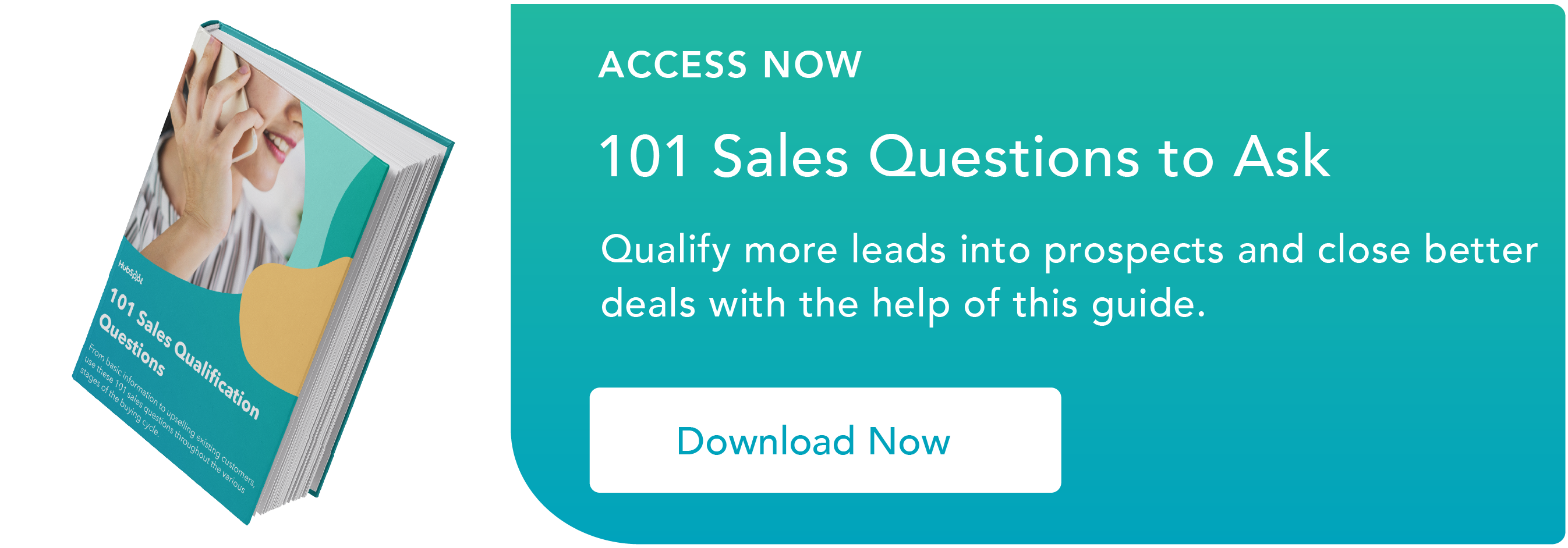Sales qualification is a game of open-ended questions. Unless you ask the right questions, you won't uncover the right needs or understand the right problems to solve. Not having that information could cost you the deal from the very beginning.

But there's an art to asking sales qualification questions. Which is why I'd like to share these tips for asking more effective open-ended questions that quickly qualify and disqualify prospects. Keep reading to find out what those questions are, but first, let’s go over what makes a good question and how you can create a great line of questioning.
What makes a good open-ended sales question?
Open-ended questions have an edge over close-ended questions because they don’t box your prospect into answering with a simple “yes” or “no.”
A close-ended question is something like, “Is your business in so-and-so industry?” An open-ended question is something like, “I see your business is in so-and-so industry. What has been your biggest challenge when keeping up with your competition this year?”
A great open-ended question will ensure your prospect answers with enough detail that you can craft a follow-up that’ll get you closer to uncovering your prospect’s needs.
Let’s take the previous question as an example.
- Initial question: “I see your business is in so-and-so industry. What has been your biggest challenge when keeping up with your competition this year?”
- Follow-up question: “I see. How do you plan to tackle [competitor’s] increasing market share next quarter?”
- Final question: “That’s an excellent plan! You have a pretty small team, so launching that plan could prove challenging. Which types of tools will you leverage for successfully executing your plan?”
.png)
Free Guide: 101 Sales Qualification Questions
101 Questions to Ask Contacts When Qualifying, Closing, Negotiating, and Upselling.
- Budget Questions
- Business Impact Questions
- Competitor Questions
- And More!
How to Create a Good Line of Questioning
When you first hop on a discovery call with a prospect, it might be tempting to jump to the questions you know will give you a clear indication of the prospect’s interest.
While being bold and blunt might work for you — especially if that’s your preferred selling style — it’s important to phase the tough questions in gradually. The more your prospects converse with you, the more comfortable they’ll feel answering questions about their needs and roadblocks.
Here are some tips for creating a great line of questioning.
1. Start with general open-ended questions.
My first tip is to start with really general questions. Below, I suggest starting with “May I ask you some questions about your business?” Why? This gives your prospect the opportunity to shut the door — or keep it open.
In some situations, it’s better than starting with “Could you tell me about your business?” That question presumes that your lead wants to speak with you. The exception is, of course, when the lead has submitted a form, clearly indicating interest. You can ask them straight away to tell you more about their business.
2. Gauge the leads’ interest as they answer your initial questions.
Read their tone, facial expression, and body language (if the meeting is over video or in person). Do they seem genuinely interested, or are they simply answering questions because you’re asking them?
Based on your previous research of the prospect’s company and their interest at the beginning, you can decide whether to cut the qualification process short or continue onward.
3. Ask early on how the company evaluates new products and services.
There’s nothing worse than getting far along and then finding out that your prospect uses certain criteria to evaluate new services. And that you don’t meet those criteria. Place this question after asking about their goals and more closely evaluating their needs.
4. Always ask about the budget.
No one likes to talk about money, but in many cases, whether a company chooses to purchase from you depends on the budget. Ask whenever it feels most appropriate, depending on the tone of the conversation and the prospects’ demonstrated interest.
5. Close by establishing follow-up steps.
Never close a sales call without establishing next steps. After you’ve asked enough questions that you feel a next step is necessary, be sure to verbally say that you’ll be emailing them on X date or sending the contract along for their perusal by the end of the day.
Open-Ended Questions for Sales
- May I ask you some questions about your business?
- Could you tell me about your business?
- You specialize in X. Why did you choose that niche?
- Were your telephone transmissions of data fast enough?
- What are your goals for the next [3, 6, or 12] months?
- What does your boss hope to accomplish in the next year?
- How does your company evaluate new products or services before buying?
- Why would you commit time and resources to something that's low to medium priority?
- Tell me about your average day. How would this solution impact your daily work?
- What's holding your team back from reaching your goals?
- Was budget a barrier in solving this problem previously?
- Why is this a priority for you now?
- Who are you doing business with now? Why did you choose that vendor?
- Is there anyone else you think I should speak with?
- What is the business problem you're trying to solve?
- What are the priorities for your business/team this quarter?
- What are your biggest pain points?
- What events are you attending this year?
- Where do you see the biggest opportunities for growth?
- When is a good date to follow up?
B2B Sales Questions
1. May I ask you some questions about your business?
In some situations, it's understood that you're there to gather information. In other situations, it's appropriate to show respect by asking permission to ask questions.
This may be a rhetorical question, but it's worth asking anyway.
2. Could you tell me about your business?
Broad, open-ended sales questions are a good way to start gathering information. They put your prospect at ease because they allow any type of response.
This is a non-threatening way to begin. Listen to what your prospect says and what they omit. Both will suggest areas to explore in greater depth, such as, "Could you tell me more about how absenteeism impacts your bottom line?"
3. You specialize in X. Why did you choose that niche?
Any good interviewer knows that the most logical source of questions comes from the interviewee's responses. Dovetail your questions with the responses by listening for key words.
Example question role play:
- [Prospect] "I own six flower shops that specialize in large event decorating."
- [Salesperson] "You specialize in large events. Why did you choose that niche?"
- [Prospect] "Lower overhead. I can work out of a warehouse rather than a storefront. I don't have to maintain perishable stock; I order in large quantities only when needed, which keeps my prices down."
- [Salesperson] "What do you mean by large events? How would you define that? What are the minimum orders?"
.png)
Free Guide: 101 Sales Qualification Questions
101 Questions to Ask Contacts When Qualifying, Closing, Negotiating, and Upselling.
- Budget Questions
- Business Impact Questions
- Competitor Questions
- And More!
4. Were your telephone transmissions of data fast enough?
Use industry jargon when appropriate. If you're talking to an expert, show your expertise by sounding as if you've spent your whole life in his industry. If you're talking to a neophyte, don't embarrass them with your technical jargon. This is especially true in retail sales, where customers look to salespeople for guidance, not confusion.
Every field has its own jargon, and you may be an expert in yours; however, your prospect may not be as well versed as you. Avoid questions that will confuse your prospect, or worse, make him feel inferior.
- Example question not to ask: “Was the baud rate of your present system satisfactory?”
- Example question to ask: “Were your telephone transmissions of data fast enough?”
5. What are your goals for the next [3, 6, or 12] months?
Keep your questions simple. If you want useful answers, ask useful questions. Convoluted or two-part questions should be avoided. Ask straightforward questions that cover one topic at a time. It’s best to ask for one answer at a time.
- Example question not to ask: “What do you think about the marketing plan and will the new ad campaign confuse customers and would that confusion actually be beneficial to the long-term product growth?”
This will not produce a meaningful answer. If you ask a two-part question, people tend to either answer the second part only or only the part they were interested in or felt safe with. Ask one question at a time!
6. What does your boss hope to accomplish in the next year?
Use a logical sequence for your questions. Prospects like to know where your questions are headed. If they can't tell, they may suspect you're manipulating them. By following keywords and asking sales questions in a logical order, you will keep your intent clear and build trust.
7. How does your company evaluate new products or services before buying?
Start off safe, general, and non-threatening. That means asking open-ended questions that don't touch on sensitive subjects. Later, after you have built up trust — and when it is appropriate — you can ask about financial ability, business stability, credit rating ... anything relevant.
8. Why would you commit time and resources to something that's low to medium priority?
It makes sense to justify a sensitive question to your prospect. After all, they have a right to know why you are asking — but then again, don't be afraid to ask your prospect tough questions.
If a prospect has multiple agenda items for your 30-minute meeting and they start with low-priority action items, don't be afraid to get to the point.
Example question role play:
- [Prospect] "Let's start with item number one on the agenda."
- [Salesperson] "Is that the most important item on the list?"
- [Prospect] "I'd say it's low to medium priority for me and the team."
- [Salesperson] "We only have 30 minutes to discuss potential solutions today. Why would you commit time and resources to something that's low to medium priority? We could maximize your time and your team's time by starting with a high-priority item first."
9. Tell me about your average day. How would this solution impact your daily work?
Many prospects will not know all the benefits of your product or service. Therefore, don't ask them what benefits they are looking for; tell them what benefits will be theirs! When you ask them what they want, have them generalize about the improvements they would like to see.
If you were to ask a prospect, “How do you expect a CRM to streamline your data-keeping efforts?” you may make them feel ignorant. They have never owned or used a CRM, so they probably have no idea of all its uses. It would be better to ask what general improvements they would like to see.
- Example question: “What are some of the data-keeping duties in the office that you find tedious and time-consuming?”
This will free the prospect of needing CRM knowledge to answer the question. They’ll answer: “Customer information, duplicate data sets, website activity,” and so on. You'll then have the information you need to recommend the hardware and software.
10. What's holding your team back from reaching your goals?
Remember, you're a liaison between your company and your customers; you are a consultant. As such, you want to question your prospect in a way that will yield the maximum amount of information with the least effort. To do so, take the pressure off the questions.
Ask them in a relaxed tone of voice. Give time for the answers, even if it means sitting quietly and waiting. Don’t be in a hurry to get to your next appointment. The investment you make in time now will pay off handsomely when the prospect evolves into an annuity.
.png)
Free Guide: 101 Sales Qualification Questions
101 Questions to Ask Contacts When Qualifying, Closing, Negotiating, and Upselling.
- Budget Questions
- Business Impact Questions
- Competitor Questions
- And More!
11. Was budget a barrier in solving this problem previously?
Good transitions are a crucial skill in a salesperson's conversational arsenal. If you veer from, "How have you tried to solve this problem in the past?" to "And what's your budget for this solution?", you risk giving your prospect whiplash at how quickly you took the conversation from their pain points to your budgetary concerns.
Instead, work in a transitional question. This bridges the gap between solution sourcing and the prospect's current budget. It keeps them feeling supported while giving you the information you need about the feasibility of their budget.
12. Why is this a priority for you now?
The worst thing that could happen to a salesperson during this part of the process is they ask a question and get a one-word answer in response.
- Example questions not to ask: "Are you happy with your current vendor?" "Did your boss support that decision?" or "Is this a priority for you now?"
Instead, frame your questions in a more exploratory way.
- Example questions: "Tell me about your experience with your current vendor." "How did your boss support or not support this decision?" and "Why is this a priority for you now?"
These small tweaks turn dead-end questions into new avenues for discovery.
13. Who are you doing business with now? Why did you choose that vendor?
Not getting the answers you need? Ask, "Why?" For example, if you ask a prospect, "Have you tried to solve this problem in the past?" and they reply with, "Yes," respond by asking, "Why didn't it work?"
"Why" questions can turn simple answers into rich ones that keep your conversation going. That way, you get the information you need to help your prospect and determine if they're the right fit.
14. Is there anyone else you think I should speak with?
In the discovery or qualifying process, it's important to keep questions focused on benefiting and solving for the prospect you're speaking with at the moment.
Avoid asking how the prospect's pain points stack up to those of another department's. That's secondhand information, and it shifts prospect focus to their colleagues instead of how the issue at hand affects them.
Instead, at the end of your questioning, ask if there's anyone else you should speak with.
- Example question: "Is there anyone else this challenge affects?"
If the answer to those questions is, "Yes, you should speak to Accounting," politely ask, "Would you mind introducing me to the right person in that department?"
This allows you to ask fresh questions, and get honest, first-hand responses from other stakeholders at the company.
15. What is the business problem you're trying to solve?
When the qualifying questions have gone well, your prospect is putty in your hands, and you know they know it's a good fit, it's tempting to make your pitch, but don't.
You have one shot to make a great pitch, and you don't want to blow it by rushing the process. Thank them for their time, give them your next steps and timeline, and take a few days (or, at least, a few hours), to craft a demo or strategy that thoughtfully addresses their pain points and presents a solution.
Qualifying questions are arguably one of the most important parts of the sales process. They tell you if you can help your prospect, and provide the intelligence you need to know exactly how to help them. Don't rush it, be thoughtful in your questioning, and reap the benefits of a question well-asked.
16. What are the priorities for your business/team this quarter?
By understanding what your prospect and their team is focused on for the next few months, you better understand how to help them — or at least what question to ask next.
If they answer, "Our team is focused on hiring, this quarter," and you offer coaching services for hiring managers, you've come to the right place. If your prospect answers, "We're really focused on becoming efficient with a small team," you might need to adjust your approach or next question to better understand if they're the right fit for your coaching services.
17. What are your biggest pain points?
Understand what they're struggling with and you'll understand how you can help. Once they share their pain points, don't immediately reply with, "Well, our new product X can really help you there."
Instead, ask follow-up questions that seek to learn more. Never offer a solution before fully understanding the scope and nuance of the issue. For example, if your prospect says, "Our sales and marketing teams aren't communicating well," follow up with, "Where would you say the communication barriers are?"
The more you learn, the better you can assist.
18. What events are you attending this year?
By asking your prospect where the company is investing time and money, you'll know where their priorities are. If your prospect answers that their marketing team has booths at three Midwestern HR conferences this fall, you know they're trying to expand their regional reach and grow their client base in the human resources industry. It also means that they value face-to-face sales.
19. Where do you see the biggest opportunities for growth?
With this question, you’re giving the prospect ample room to share where their team or business can improve. This is especially a good question if you didn’t get the information you needed when you asked about the customer’s pain points. Plus, it phrases it in a way that positions the pain points as opportunities that can be leveraged for growth.
Your prospect may also answer this question in financial terms. They might say something like, “Well, we failed to meet revenue goals last quarter, and I see an opportunity for us to exceed those goals by expanding into new markets.” In that case, segue into pain points by asking about challenges their team could face.
.png)
Free Guide: 101 Sales Qualification Questions
101 Questions to Ask Contacts When Qualifying, Closing, Negotiating, and Upselling.
- Budget Questions
- Business Impact Questions
- Competitor Questions
- And More!
20. When is a good date to follow up?
If you don’t feel comfortable setting a follow-up date for the prospect, leave the option open by asking this question. I would highly recommend asking this question to prospects who’ve been proactive so far or who’ve shown genuine interest in the product, because they’ll easily set a date.
A prospect who’s not so sure might vacillate, and that could kill your deal before you can deliver your closing pitch. In that case, reword your question as follows: “Can I follow up with you on mm/dd?” If the date doesn’t work for them, prompt them to offer an alternative.
Use Open-Ended Sales Questions in Your Next Call
Asking open-ended questions is the key to qualifying prospects more quickly and efficiently. With the questions I’ve suggested above, you’ll be sure to determine whether a prospect is a good fit for your product and successfully close the deal.
Editor's note: This post was originally published in June 2014 and has been updated for comprehensiveness.
![Free Download: 101 Sales Qualification Questions [Access Now]](https://no-cache.hubspot.com/cta/default/53/e97d6603-b40e-4085-ad55-0074b7351ead.png)

![How to Use BANT to Qualify Prospects in 2024 [Expert Tips]](https://blog.hubspot.com/hubfs/bant-questions-6606f7b6c0d9e.webp)



![21 Signs Your Buyer Is a Poor Fit [Sales Process Checklist], According to HubSpot's Former Sales Director](https://blog.hubspot.com/hubfs/Bad fit checklist.jpg)




